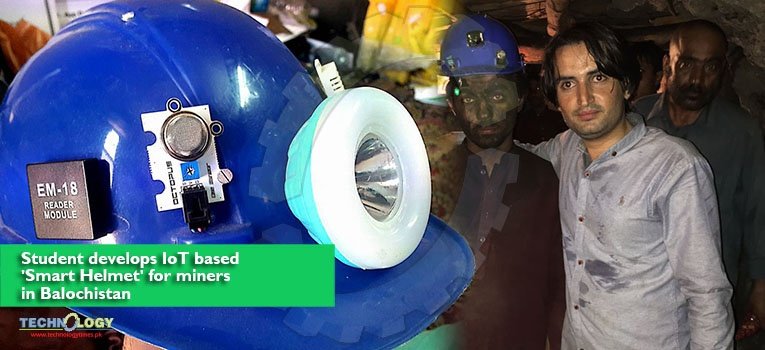The Smart Helmet designed by Ali Gul, a BUITEMS graduate, is embedded with gas temperature humidity real-time location systems and heartbeat sensors to detect pulse rates. It gives early warnings of the presence of different poisonous gases

A computer engineering student Ali Gul did his final year project from Balochistan University of Information Technology, Engineering and Management Sciences (BUITEMS). He came close to an incident with his elder brother who worked at a coal mine, had an accident and was seriously injured. Ali came up with an idea to resolve this major issue by using his computing skills and knowledge to save miners’ lives and make sure their safety in dangerous environments and hence, came up with the idea of ‘Smart Helmet’.
IoT based Smart Helmet being incubated at the National Incubation Centre (NIC) in Quetta. The core features of smart helmet is able to identify multiple gas leakages, track real-time location, analyse health vitals for miners, and also has the capability to inform miners about potentially dangerous areas inside the mines through vibrations, and toggling of colourful lights. The end-goal of this product is to keep the workers safe and reduce fatal accidents by generating and analyzing data.
Balochistan Chief Minister Jam Kamal Khan and mining secretary Saleh Baloch , after watching an interview of Ignite CEO Yusuf Hussain on television about Smart Helmet, tweeted that his government is willing to support the product, and a go-to-market strategy by supplying Smart Helmet to miners in the province.
In an interview, Gul told the technical details of Smart Helmet, “This helmet is embedded with gas temperature humidity real-time location systems and heartbeat sensors to detect pulse rates. It gives early warnings of the presence of different poisonous gases. There’s a base station to monitor the coal mines’ environmental condition and a ventilation fan inside the mines.” The technologies used in the development of Smart Helmet include Zigbee, Radio Frequency Identification (RFID), Artificial Intelligence (AI), and the Internet of Things (IoT).